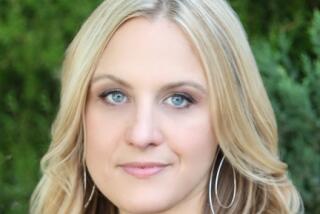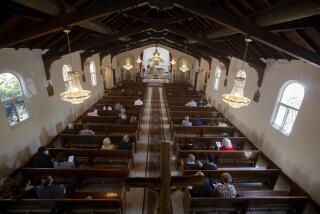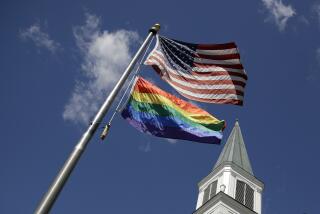Infrequent Churchgoers Can Be Wooed, Study Says
- Share via
NEW YORK — Parents who grew up in the ‘60s started the migration from the church and their children are following them in greater numbers, but there still may be time to reach the lost generations of “marginal” Protestants.
A new study says not all “unchurched” Protestants have given up on their spiritual heritage. More than one in four say they still desire to be affiliated with the church and could be won back with special evangelistic strategies.
Some who have strong beliefs may only require a ride to church, and some liberals may need to be disabused of the notion that irregular churchgoing is unacceptable, according to the study by Penny Long Marler of Samford University and C. Kirk Hadaway of the United Church Board for Homeland Ministries.
“We think there’s this legacy effect in operation, where people continue to value religion but do not participate,” Hadaway said.
Gallup polls estimate that more than 78 million Americans are “unchurched”--not church members or not attending church in the past six months.
Marler and Hadaway say church officials need to be more discriminating in classifying less active church people who still claim a religious affiliation.
The findings were based on a random survey in 1991 of 2,012 Protestant adults in Arizona, Connecticut, Georgia and Ohio. The authors divided infrequent churchgoers into two categories: “mental affiliates,” who attend church several times a year, once or twice a year or never--and who are not church members; and “marginal members,” who seldom, if ever, attend church but still say they are church members. The study identified 529 mental affiliates and 207 marginal members.
Marginal members who still identify with a church are most likely to return to active membership, the study found.
Surprisingly, the largest group of marginal members are “traditionalists,” people who have strong religious beliefs but who are unable to attend church for reasons ranging from chronic health problems to a lack of transportation.
“If church buildings were more accessible, or if church programming were more creative and flexible, these persons would increase their involvement almost instantly,” the study’s authors said.
In the case of liberals--another group of marginal members--the researchers suggest that churches set new norms for church membership, making irregular attendance acceptable, for instance.
The group that the authors said may be the hardest to reach are lifelong marginals, who vaguely perceive religion as positive and are likely to show up on holidays and for big events such as baptisms and weddings.
More to Read
Sign up for Essential California
The most important California stories and recommendations in your inbox every morning.
You may occasionally receive promotional content from the Los Angeles Times.













